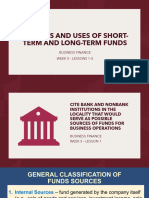0% found this document useful (0 votes)
703 views3 pagesSources of Funding For Small Business: 1) Bootstrapping Your Startup Business
1. Bootstrapping by raising funds from personal savings, family, and friends is an easy option that maintains control over the business without formalities or losing equity to investors.
2. Taking pre-orders or advance payments from customers before a product or service launches can improve cash flow and make customers early investors.
3. Other options include obtaining bank loans or loans from non-bank financial companies by sharing business plans and financial projections, crowd-funding platforms, and government programs that provide startup capital such as grants and loans from organizations like SIDBI.
Uploaded by
Chietransh JainCopyright
© © All Rights Reserved
We take content rights seriously. If you suspect this is your content, claim it here.
Available Formats
Download as DOCX, PDF, TXT or read online on Scribd
0% found this document useful (0 votes)
703 views3 pagesSources of Funding For Small Business: 1) Bootstrapping Your Startup Business
1. Bootstrapping by raising funds from personal savings, family, and friends is an easy option that maintains control over the business without formalities or losing equity to investors.
2. Taking pre-orders or advance payments from customers before a product or service launches can improve cash flow and make customers early investors.
3. Other options include obtaining bank loans or loans from non-bank financial companies by sharing business plans and financial projections, crowd-funding platforms, and government programs that provide startup capital such as grants and loans from organizations like SIDBI.
Uploaded by
Chietransh JainCopyright
© © All Rights Reserved
We take content rights seriously. If you suspect this is your content, claim it here.
Available Formats
Download as DOCX, PDF, TXT or read online on Scribd
/ 3





























































































